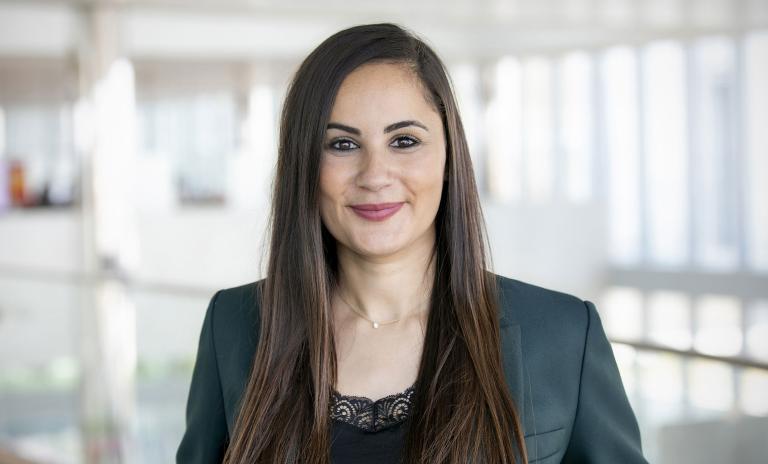Robust Organizations
Roland Berger regularly publishes studies on the topic of robust organizations, discussing how corporations revolve stronger from change, disruption and crises.


By Cyrus Asgarian and Fabian Huhle
In this interview Khadija Ben Hammada, CHRO of Merck, discusses the importance of thinking like a business leader as a CHRO, how technology is changing HR, and the value of taking a different approach to leadership.

Merck is a German multinational science and technology company headquartered in Darmstadt. It is one of the world’s largest pharmaceutical groups, with a presence in 65 countries, covering three main business lines: healthcare, life science, and electronics.
Khadija Ben Hammada is Chief Human Resources Officer (CHRO) at Merck, where she is responsible for approximately 63,000 employees around the world. She joined Merck in 2010, working in various HR roles in Europe, Asia-Pacific, and the United States.
Fabian Huhle: Khadija, for a long time, HR departments have been fighting to enhance the role of HR and gain a greater say in shaping a company’s future. As CHRO at Merck, how do you see the role of HR today, and that of the CHRO specifically?
Khadija Ben Hammada: I believe the CHRO, and HR in general, have a dual responsibility – to act as a business leader and to advocate for employees. A business mindset is essential in HR, but HR workers must also be able to stand up when the company's values, like integrity and fair treatment of people, are at risk. These two facets are vital to enhancing the role of HR and having more of a say at a leadership level. Whenever I propose a new initiative – launching an AI tool or skills management system, for instance – I build a business case showing the value it brings to the business on the top and bottom line, how the work we are doing help prepare our workforce to be ready for the future, how do we enhance productivity yet bring innovation. By showing that HR can think like a business leader, we earn our place at the leadership table.
Cyrus Asgarian: Are there specific tools or strategies you’ve implemented to achieve this?
Khadija Ben Hammada: Absolutely. It starts with understanding the business strategy before building a people strategy. Connecting these two facets is crucial when presenting to the board or executive team. Tools such as strategic workforce planning help businesses plan their people scenarios based on different business environments. At Merck, we are also implementing an AI skills management system to create an inventory of our current skills and identify gaps. Additionally, every business partner is required to have a people plan aligned with their business plan. You can’t have one without the other.
Cyrus Asgarian: Besides tools and personal engagement, how important is it for business leaders to rotate into HR roles? We see HR workers move into business roles, but less so vice versa.
Khadija Ben Hammada: This is crucial but has been challenging because HR was not traditionally seen as a business leadership role. I think we’re at an inflection point: the topics within HR are more intriguing to business leaders because they see the potential for delivering business impact. Historically, those who moved from business to HR weren't the top performers. There was a popular misconception that everyone can work in HR, but HR requires a specific skill set that not everyone possesses. We need to acknowledge that.
Cyrus Asgarian: How do you drive a mindset shift in HR towards business cases and impact demonstration?
Khadija Ben Hammada: When launching a new initiative, like a leadership program, I ask five key questions: What problem are we solving? What are the gains? Who is the target audience? How do we implement it? What are the potential risks and how do we mitigate them? By approaching projects with this level of rigor, we align HR with business objectives.
Fabian Huhle: How have you structured your organization to meet these requirements? Are you following the classical three-pillar model?
Khadija Ben Hammada: We use a business partner model with some adaptations. Our organization is defined by the impact generated, not by processes. For example, we have global solution owners instead of global centers of expertise, focusing on solutions rather than processes. Business partners operate on two levels: strategic at the sector level and operational at the market level. This ensures market organizations are connected to business needs.
Fabian Huhle: I'd like to come back to the mandate of the HR function. Do you agree that the CEO, CFO, and CHRO will drive future transformations together?
Khadija Ben Hammada: Absolutely. The CHRO’s role relies on the trust of the CEO. You need the confidence and the ability to challenge and consult when necessary. Together with the CFO, this forms a powerful alliance, where the CHRO focuses on organizational health and the CFO on financial performance, aligning with the CEO for optimal outcomes.
Cyrus Asgarian: What role does technology such as AI play in HR’s support of business transformations?
Khadija Ben Hammada: AI offers an opportunity to be both effective and efficient. It can help provide high-quality service while reducing costs. We explore AI for talent attraction and recruiting, focusing on the ROI of these technologies. This aligns with the collaborative approach of the CEO, CFO, and CHRO in adopting advanced technology.
Cyrus Asgarian: Does this require a shift in HR capabilities?
Khadija Ben Hammada: Yes. We must understand AI’s impact on our work and become comfortable with it. We’re building an HR academy to integrate AI across the employee journey – from onboarding to exits. We’re also identifying and addressing capability gaps within HR to ensure readiness.
Fabian Huhle: In the past 10-15 years Merck has transformed from a mid-tier traditional German industry player to a global modern science and technology player . Restructuring, portfolio overhaul and several large acquisitions and also divestments characterize the period. How does HR support leaders through these challenges and where are its limitations?
Khadija Ben Hammada: No one anticipated the magnitude of recent changes brought on by COVID-19, wars, and economic downturns. Leaders are stressed, often reverting to command and control rather than motivation and inspiration. HR needs to support and equip leaders to navigate these challenges. Let me give you a specific example: Our annual leadership conference is typically focused on traditional topics such as business, financials, and strategy, supported by inspirational guest speakers. But I felt it was time to take a different approach. We spent two days working in small groups of board members and managers to shift the focus from five board members and 150 leaders to a more united group of 155 leaders. Those little things made such a huge difference. We focused on building proximity, trust, and cohesion. We’ve followed this with cross-sector group coaching sessions, which we plan to roll out to 10,000 other managers.
Fabian Huhle: How do you gain top management's acceptance for such interventions?
Khadija Ben Hammada: To gain the acceptance and enrollment of top management for an initiative like this, you must have data to back-up your recommendations. For the effort I just spoke about, I presented data on engagement, attrition rates, and retention, proving the need for action. You also must show that you have a tangible action plan to address the challenges ahead, and you need to lead with a strong sense of accountability. The board or executive committee needs to trust you in your role and recommendation, and this approach will help you to gain that trust.
Fabian Huhle: How often do you conduct engagement surveys?
Khadija Ben Hammada: We conduct comprehensive engagement surveys annually, covering well-being, mental health, development, and diversity. Additionally, when warranted, we run shorter pulse checks on specific topics, sometimes to targeted portions of the employee base.
Cyrus Asgarian: Let’s look ahead: What are the main trends you expect to see in HR over the next five years?
Khadija Ben Hammada: AI will significantly impact HR. And I’m not talking about AI replacing jobs – we need to work out how best to integrate it as a partner, so HR can be more efficient and effective. Leadership will also evolve, emphasizing empathy and moving from command and control to motivation and inspiration.
Fabian Huhle: What are the biggest obstacles to these changes?
Khadija Ben Hammada: Focusing too much on costs and not enough on people is a major obstacle. People-management KPIs should be as important as financial KPIs. We also need to invest in technology and education – if you really want to upskill employees, you need to invest. And when it comes to culture, the only way to maintain credibility is to walk the talk.
Cyrus Asgarian: What about new ways of working for HR – agile, cross-functional approaches, for instance?
Khadija Ben Hammada: Every operating model can work when you have the right skills. Agility is important, but you need the right culture and personnel.
Fabian Huhle: And how do you integrate business representatives in developing HR products?
Khadija Ben Hammada: For major HR solutions, like our new PMP process, we use a "marathon and sprint" approach, involving business leaders and millennials. It’s fascinating, because the younger generation tends to be bolder and more strategic. This diverse input helps create the right product and facilitates change management.
Cyrus Asgarian: Finally, what qualities do you think future HR leaders need?
Khadija Ben Hammada: Depending on the personality of the CEO and the company’s agenda, you might need different types of CHROs. If I were a CEO, I’d be looking for a CHRO who can understand how an organization runs from financial, strategic, investor, and stakeholder perspectives. CHROs also need the courage to uphold integrity and values, and put the company and employees first. Empathy and a service mindset are crucial for this role – it’s not about you, it's about the people and the company.
Cyrus Asgarian & Fabian Huhle: Khadija Ben Hammada, thank you for talking to us.